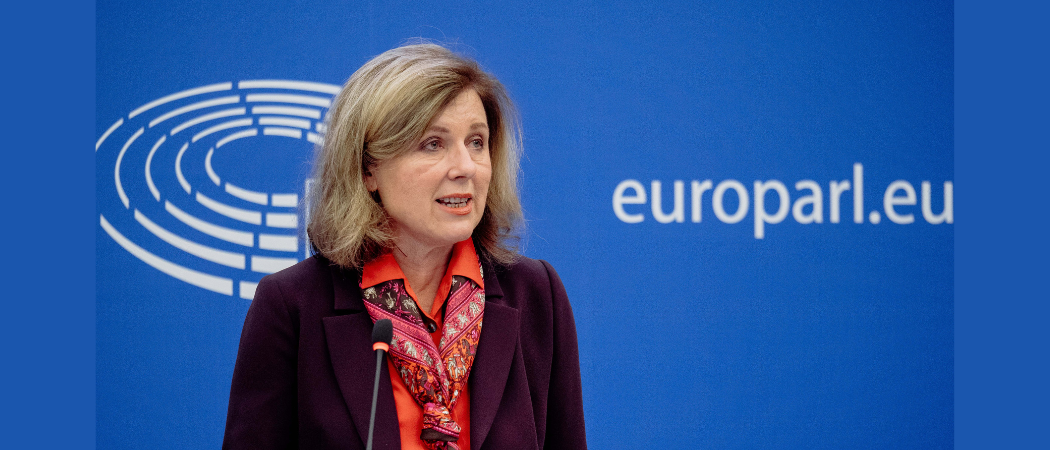The proposed directive on Transparency of Interest Representation, designed to prevent malign foreign lobbying, could force universities to register any foreign-funded research, observers fear

Věra Jourová, vice-president of the European Commission in charge of values and transparency, speaking at a press conference in December 2023 about the Defence of Democracy package. Photo: Valentine Zeler / European Union
Proposed rules to combat foreign influence operations in the EU could ensnare research projects funded from outside the bloc, university and science representatives have warned.
In December, the European Commission put forward plans to ensure there is a public, transparent record of foreign-funded work that could sway EU policymaking or public opinion, after worries about covert Chinese and Russian influence operations.
But the directive on Transparency of Interest Representation, which is supposed to harmonise registration rules across the EU, would include “activities carried out on behalf of a third country entity in the context of research and education” that, for example, favour “a specific public policy”.
This broad language has several in the academic sector worried that universities will have to register myriad foreign-funded research projects, creating a huge bureaucratic burden and posing a threat to academic freedom.
“As an example, a PhD student from Bangladesh who is studying water management in the Netherlands through a national, Bangladeshi, scholarship, would probably be subject to registration requirements under the directive,” said Joep Roet, deputy director of Neth-ER, a Brussels-based organisation representing Dutch research organisations.
“This is because if they publish their findings it could arguably be seen as having the potential to influence policy in the EU,” he said.
The Commission released the long-delayed plans in December, against fears that Russia or China could influence this year’s European elections.
A recently released study by the authority that monitors European political parties found myriad recent examples of interference, ranging from social media disinformation about the origins of the COVID-19 pandemic, to a media smear against a Czech politician designed to discredit Taiwan.
Yet NGOs worry that the plans will backfire because an EU register of foreign-funded projects will stigmatise well-meaning initiatives.
The European Civic Forum, also worries the EU register would mirror similar laws by repressive regimes, used to undermine civil society groups. The EU itself last year criticised a proposed “transparency of foreign influence law” in Georgia, which was eventually withdrawn after mass protests.
No room for research impact
Universities and research institutes are also concerned that they could be dragged into the net and forced to register scientific projects.
The proposed directive does explicitly exclude “research pursued by researchers in a subject of their choice, the dissemination of the findings of that research, or teaching and education activities”.
But this exemption does not apply “where the clear purpose of these activities is to influence the development, formulation or implementation of policy or legislation, or public decision-making processes, in the EU and they are carried out on behalf of a third country entity”.
If this language is interpreted “tightly”, then “there is no room for scientists funded by third-country parties to engage in valorization or impact,” said Bram Ruber, a policy adviser at Neth-ER.
“It is precisely the intention that scientific research influences policy,” he said. “It is undesirable if this is no longer possible if the research is funded by an institute from a third country.”
The directive would mean universities have to provide a wealth of information about research projects funded from outside the EU, including the “main goals, remit and field of interest” of the funder, the amounts of money involved, and the policies that could be influenced by the research.
It’s still unclear exactly how member states will interpret the directive; some could do so in a way that creates mountains of paperwork for universities, said Thomas Jørgensen, director of policy coordination and foresight at the European University Association.
“The fear is that there’s so much of a grey zone,” he said. “Clarity will come very slowly, if ever.”
The broader problem, he said, is that the register could end up including a mixture of innocuous and malign projects, with no way of working out which is which.
The Commission is “making a register that doesn’t say anything other than stigmatising those in it,” he said. “How can you do this and not interfere with academic freedom?”
The Commission has stressed that the penalties for failing to comply would be fines, rather than any kind of criminal sanction. Enforcement will be left up to member states, many of which already have national registers.
Responding to the concerns of NGOs, the Commission has also said it wants to avoid any stigma from being featured on the register.
“Inclusion in the register should […] not result in any negative labelling or questions of the credibility or legitimacy of the entity concerned,” the Commission has said. Instead, the focus is simply on transparency, with key information in the registry open to the public.





 A unique international forum for public research organisations and companies to connect their external engagement with strategic interests around their R&D system.
A unique international forum for public research organisations and companies to connect their external engagement with strategic interests around their R&D system.